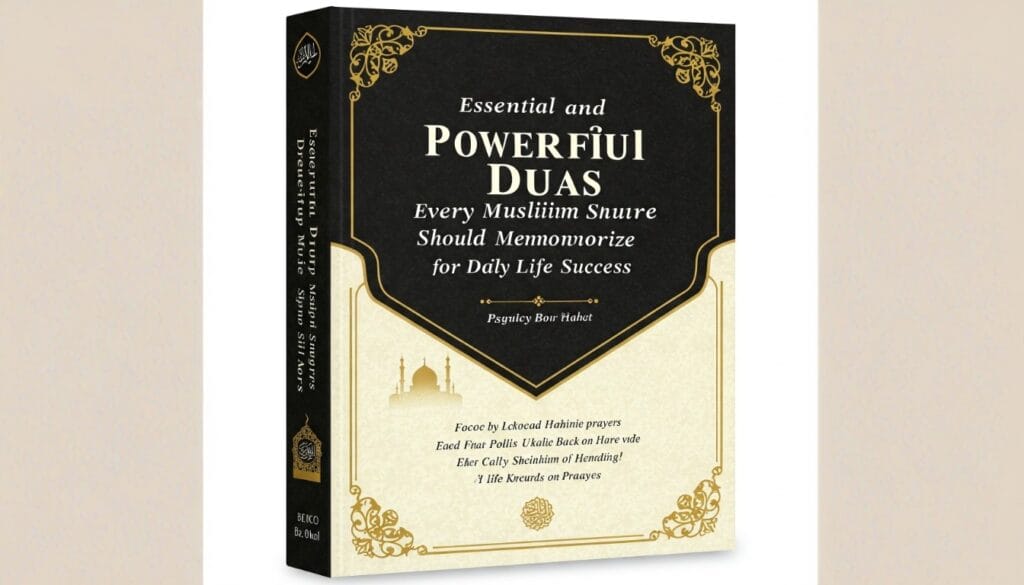In Islam, dua (supplication) is a profound act of worship that connects a Muslim directly to Allah (SWT), seeking His guidance, protection, and blessings for success in all aspects of life. From starting the day with gratitude to seeking protection during travel, duas provide spiritual strength and practical solutions for daily challenges. This comprehensive guide explores essential and powerful duas every Muslim should memorize to achieve success in daily life, offering their meanings, benefits, and practical applications. Whether you’re aiming for success in work, relationships, or spiritual growth, these duas will empower you to navigate life with faith and confidence.

Introduction: The Role of Dua in Achieving Daily Success
The Quran emphasizes the importance of dua, stating, “And your Lord says, ‘Call upon Me; I will respond to you’” (Surah Ghafir 40:60). The Prophet Muhammad (PBUH) described dua as “the essence of worship” (Tirmidhi), highlighting its centrality in a Muslim’s life. By incorporating duas into daily routines, believers can seek Allah’s assistance in every endeavor, from mundane tasks to significant milestones, ensuring success in this world and the Hereafter.
This article covers:
- Key duas for daily life success, including Arabic text, transliteration, and translation.
- The spiritual, emotional, and practical benefits of regular supplication.
- Tips for memorizing and incorporating duas into your routine.
- Recommended resources (books, apps, and courses) to enhance your dua practice.
- Reviews, ratings, and fee structures for premium Islamic learning tools.
- SEO strategies for creating a blog post about duas to maximize online reach.
- Answers to common questions about using duas for success.
Whether you’re a busy professional, a student, or a parent, this guide will equip you with the duas needed to thrive in daily life while staying connected to Allah (SWT).
Why Duas Are Essential for Daily Life Success
Spiritual Connection and Guidance
Duas serve as a direct line to Allah (SWT), fostering a deep sense of reliance (tawakkul) on His wisdom and mercy. The Quran assures, “And whoever relies upon Allah – then He is sufficient for him” (Surah At-Talaq 65:3). By supplicating regularly, Muslims align their intentions with Allah’s will, seeking His guidance to make sound decisions and achieve meaningful success.
The Prophet (PBUH) frequently made duas for success in worldly and spiritual matters. For example, he would say, “O Allah, make what is lawful enough for me, and keep me away from what is unlawful” (Tirmidhi). This practice underscores dua as a tool for seeking lawful sustenance and divine support.
Emotional and Practical Benefits
Beyond their spiritual value, duas offer emotional stability and mental clarity. Reciting supplications can reduce stress, boost confidence, and foster a positive mindset, all of which are critical for success. Research shows that prayer and mindfulness practices, like dhikr and dua, lower anxiety and improve focus, helping individuals tackle daily challenges effectively. By starting the day with duas for protection or productivity, Muslims can approach their tasks with purpose and resilience.
Read more:
Essential Duas for Daily Life Success
Below are powerful duas every Muslim should memorize, covering various aspects of daily life, such as morning and evening routines, work, travel, and personal growth. Each dua includes its Arabic text, transliteration, translation, and context for easy learning and application.
1. Morning and Evening Adhkar (Protection and Blessings)
These duas are recited daily to seek Allah’s protection and blessings, setting the tone for a successful day.
Arabic:
أَعُوذُ بِكَلِمَاتِ اللَّهِ التَّامَّاتِ مِنْ شَرِّ مَا خَلَقَ
Transliteration:
A’udhu bi kalimatillahit-tammati min sharri ma khalaq.
Translation:
I seek refuge in the perfect words of Allah from the evil of what He has created.
When to Recite:
- Three times in the morning and evening for protection from harm.
- Before leaving the house or starting the day.
Additional Dua:
بِسْمِ اللَّهِ الَّذِي لا يَضُرُّ مَعَ اسْمِهِ شَيْءٌ فِي الأَرْضِ وَلا فِي السَّمَاءِ وَهُوَ السَّمِيعُ الْعَلِيمُ
Transliteration:
Bismillahil-ladhi la yadurru ma‘a ismihi shay’un fil-ardi wala fis-sama’i wahuwas-sami‘ul-‘alim.
Translation:
In the name of Allah, with whose name nothing on earth or in heaven can cause harm, and He is the All-Hearing, the All-Knowing.
When to Recite:
- Three times in the morning and evening for comprehensive protection.
2. Dua for Success in Work and Studies
This dua seeks Allah’s assistance in achieving success in professional and academic endeavors.
Arabic:
رَبِّ زِدْنِي عِلْمًا
Transliteration:
Rabbi zidni ‘ilma.
Translation:
My Lord, increase me in knowledge.
When to Recite:
- Before studying, working, or starting a new project.
- During moments of doubt or difficulty in tasks.
Additional Dua:
اللَّهُمَّ انْفَعْنِي بِمَا عَلَّمْتَنِي وَعَلِّمْنِي مَا يَنْفَعُنِي
Transliteration:
Allahumma infa‘ni bima ‘allamtani wa ‘allimni ma yanfa‘uni.
Translation:
O Allah, benefit me with what You have taught me, and teach me what will benefit me.
When to Recite:
- Before exams, meetings, or learning new skills.
3. Dua for Ease and Success in Difficult Tasks
This dua asks Allah to make challenges easier and grant success.
Arabic:
اللَّهُمَّ لا سَهْلَ إِلا مَا جَعَلْتَهُ سَهْلاً، وَأَنْتَ تَجْعَلُ الْحَزْنَ إِذَا شِئ صنعت سَهْلاً
Transliteration:
Allahumma la sahla illa ma ja‘altahu sahlan, wa anta taj‘alul-hazna idha shi’ta sahlan.
Translation:
O Allah, there is no ease except in that which You have made easy, and You make the difficulty, if You will, easy.
When to Recite:
- Before starting a challenging task, such as a job interview or a complex project.
- When feeling overwhelmed by responsibilities.
4. Dua for Travel (Safety and Success)
This dua ensures safety and success during journeys, whether for work, family, or leisure.
Arabic:
سُبْحَانَ الَّذِي سَخَّرَ لَنَا هَٰذَا وَمَا كُنَّا لَهُ مُقْرِنِينَ وَإِنَّا إِلَىٰ رَبِّنَا لَمُنْقَلِبُونَ
Transliteration:
Subhanalladhi sakhkhara lana hadha wa ma kunna lahu muqrinin, wa inna ila rabbina lamunqalibun.
Translation:
Glory be to Him who has subjected this to us, and we could not have subdued it. And indeed, to our Lord, we will return.
When to Recite:
- When embarking on a journey (by car, plane, or other means).
- Upon boarding a vehicle or starting travel.
5. Dua for Barakah (Blessings) in Time and Wealth
This dua seeks Allah’s blessings to make your time and resources fruitful.
Arabic:
اللَّهُمَّ بَارِكْ لِي فِي وَقْتِي وَرِزْقِي
Transliteration:
Allahumma barik li fi waqti wa rizqi.
Translation:
O Allah, bless my time and my sustenance.
When to Recite:
- In the morning to seek productivity and blessings.
- Before budgeting or planning your day.
How to Memorize and Incorporate Duas into Daily Life
To make duas a seamless part of your routine, consider these practical strategies:
- Start Small: Begin with short duas like “Rabbi zidni ‘ilma” and gradually memorize longer ones.
- Use Audio Resources: Listen to dua recitations on apps like Muslim Pro or YouTube channels like Bayyinah TV to improve pronunciation.
- Set Reminders: Use a prayer app or phone alarm to prompt dua recitation in the morning, evening, or before specific tasks.
- Create a Dua Chart: Write down duas with their meanings and display them at home or work for quick reference.
- Combine with Salah: Recite duas after obligatory prayers, as this is a time when supplications are readily accepted.
- Teach Others: Share duas with family or friends to reinforce your memory and spread blessings.
The Importance of Sincerity and Tawakkul
For duas to yield success, they must be accompanied by sincerity (ikhlas) and trust in Allah (tawakkul). The Prophet (PBUH) said, “Allah does not accept the dua from a heart that is heedless or distracted” (Tirmidhi). To enhance your dua practice:
- Be Present: Focus on the meaning of each dua and avoid rushing through recitations.
- Have Confidence: Believe that Allah (SWT) will respond in the best way, even if the outcome differs from your expectations.
- Take Action: Pair duas with effort, such as working diligently or seeking knowledge, as success requires both supplication and striving.
By combining duas with tawakkul and action, you create a holistic approach to achieving daily success.
Recommended Resources for Learning Duas
To deepen your dua practice, explore these highly rated resources:
1. Books
- “Fortress of the Muslim” by Sa’id bin Ali bin Wahf Al-Qahtani
- Description: A compact collection of authentic duas for daily life, including work, travel, and protection.
- Rating: 4.8/5 (Amazon reviews).
- Price: $5–$10 (paperback).
- Why Choose It: Portable, with Arabic, transliteration, and translation.
- “Supplications for Success” by Abu Ammaar Yasir Qadhi
- Description: A guide to duas for achieving success in worldly and spiritual matters.
- Rating: 4.7/5 (Goodreads).
- Price: $12–$18.
- Why Choose It: Combines practical advice with scholarly insights.
2. Mobile Apps
- Athan: Prayer Times & Quran
- Features: Includes a dua section with audio recitations, translations, and reminders.
- Rating: 4.6/5 (Google Play).
- Price: Free with in-app purchases; Premium at $9.99/year.
- Review: “The dua feature is perfect for daily routines. Audio helps with memorization” (user review).
- Dua & Azkar
- Features: A dedicated app for duas and dhikr, categorized by daily needs.
- Rating: 4.5/5 (App Store).
- Price: Free with ads; ad-free version at $4.99.
- Review: “Simple and effective for learning duas on the go” (user review).
3. Online Courses
- SeekersGuidance: Daily Supplications for Success
- Description: A free course covering essential duas and their application in daily life.
- Rating: 4.9/5 (student feedback).
- Price: Free.
- Why Choose It: Taught by qualified scholars, accessible to all levels.
- Al-Maghrib Institute: Mastering Dua
- Description: A paid course exploring the etiquette and impact of dua for success.
- Rating: 4.8/5 (student reviews).
- Price: $99–$150 (varies by region).
- Why Choose It: Interactive and in-depth, ideal for serious learners.
Fee Structure for Premium Resources
| Resource | Type | Price | Notes |
|---|---|---|---|
| Fortress of the Muslim | Book | $5–$10 | Available on Amazon |
| Supplications for Success | Book | $12–$18 | Available at Islamic bookstores |
| Athan Premium | App | $9.99/year | Ad-free with exclusive content |
| Dua & Azkar Ad-Free | App | $4.99 (one-time) | No subscription required |
| SeekersGuidance Course | Online Course | Free | Donations encouraged |
| Al-Maghrib Mastering Dua | Online Course | $99–$150 | Discounts for early registration |
Reviews and Ratings of Recommended Resources
Fortress of the Muslim
- Pros: Affordable, comprehensive, and easy to carry.
- Cons: Small font size may be challenging for some.
- User Review: “This book is a must-have for daily duas. It’s helped me stay consistent” (Amazon, 5/5).
Athan App
- Pros: User-friendly, multilingual, and includes audio recitations.
- Cons: Ads in the free version can be disruptive.
- User Review: “The dua reminders keep me on track for success every day” (Google Play, 4/5).
SeekersGuidance Course
- Pros: Free, high-quality content, and accessible to beginners.
- Cons: Requires self-discipline to complete.
- User Review: “This course transformed my dua practice. Highly recommend!” (Student feedback, 5/5).
SEO Tips for Writing a Blog Post About Duas
To ensure your blog post ranks well and reaches a broad audience, follow these SEO best practices:
- Use Targeted Keywords:
- Primary keyword: “Duas for daily life success”
- Secondary keywords: “Islamic supplications for success,” “powerful duas for daily routine,” “Muslim prayers for achievement.”
- Include keywords in the title, meta description, headings, and content (1–2% keyword density).
- Optimize Meta Description:
- Example: “Discover essential Islamic duas for daily life success. Learn powerful supplications for work, travel, and spiritual growth with Arabic text, translations, and tips.”
- Use Structured Headings:
- Use H1 for the main title, H2 for sections (e.g., “Essential Duas”), and H3 for subsections (e.g., specific duas).
- This enhances readability and SEO.
- Incorporate Links:
- Link to related blog posts on your site (e.g., “How to Practice Tawakkul” or “Benefits of Morning Adhkar”).
- Reference credible sources like Sunnah.com or IslamicFinder for authenticity.
- Add Visuals:
- Include images of Arabic calligraphy or serene Islamic backgrounds.
- Use alt text (e.g., “Arabic text of Dua for Success in Work”).
- Write for Your Audience:
- Address reader needs, such as achieving work-life balance or spiritual growth.
- Use a conversational, encouraging tone to build trust.
- Encourage Engagement:
- End with a call-to-action (e.g., “Share your favorite dua for success in the comments!”).
- Add social sharing buttons to increase reach.
Common Questions About Duas for Daily Success
Can I Recite Duas in My Native Language?
Yes, Allah (SWT) understands all languages. While Quranic and Prophetic duas carry unique blessings, you can make personal supplications in your native language for specific needs.
How Many Times Should I Recite Each Dua?
Follow the Sunnah where specified (e.g., three times for morning adhkar). For general duas, recite as often as needed, especially during moments of focus or difficulty.
What If I Don’t See Immediate Results?
Success through dua requires patience and trust in Allah’s timing. The Quran states, “Perhaps you dislike something which is good for you” (Surah Al-Baqarah 2:216). Continue supplicating while taking瀣taking action, and Allah will respond in the best way.
Conclusion: Achieve Success with the Power of Dua
Memorizing and reciting essential duas is a transformative practice that empowers Muslims to achieve success in daily life. From seeking protection and knowledge to ensuring barakah in time and wealth, these supplications provide spiritual, emotional, and practical support. By incorporating duas into your routine with sincerity and tawakkul, you can navigate life’s challenges with confidence and draw closer to Allah (SWT).
Start today by memorizing one dua from this guide and reciting it daily. Explore the recommended books, apps, and courses to deepen your practice, and share this guide with others to spread the blessings of dua. Let us know in the comments which dua you’re starting with and how it’s impacting your life!
Call-to-Action: Subscribe to our newsletter for more Islamic content, and download our free Daily Dua Guide PDF to keep these powerful supplications at your fingertips. May Allah (SWT) grant you success in this world and the Hereafter. Ameen.














Post Comment